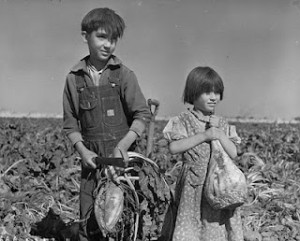In my interviews for the Legacy Project, I loved listening to the Texas accent. Apparently, some say the classic Texas accent is disappearing, but not among these folks. Many of these elders were from East Texas, with its soft, musical drawl and slow cadence. Twenty-five cents becomes “twenny-fi cints,” kid becomes “kee-ud,” business to “bid-ness,” and government to “gummint.” There was a lulling quality in my conversations with very old Texans, but also a remarkably clear way of condensing the past and expressing their feelings about it. And Texans are polite; no one hurried me along or refused to at least try to answer a question.
disappearing, but not among these folks. Many of these elders were from East Texas, with its soft, musical drawl and slow cadence. Twenty-five cents becomes “twenny-fi cints,” kid becomes “kee-ud,” business to “bid-ness,” and government to “gummint.” There was a lulling quality in my conversations with very old Texans, but also a remarkably clear way of condensing the past and expressing their feelings about it. And Texans are polite; no one hurried me along or refused to at least try to answer a question.
One thing that almost all the Texans had in common was that they grew up working – and working hard. Martin, 78, was typical. From a very early age, he was expected to work, and it taught him valuable life lessons. He grew up on a farm during the Great Depression, he told me, and that’s what kept the family alive. “We had enough to eat because of the vegetable garden.”
We chopped cotton, we picked cotton, we milked cows, we carried wood for the cookstove and the fireplace – we cooked over a wood cook stove. They cooked that way until the 1940s. The didn’t have electricity or running water until after I left home. We drew water from the well to do wash. You had to draw the water, put it in the tub. With everything that had to be done on a farm, we tagged along and helped.
Martin embodies the work history of many of the elder I interviewed, and he shows the legacy over his life course.
The family home that I grew up in was very religious, and the community I grew up in was about three hundred people. And we had church and family and our farm where we worked all the time, we worked round the clock and nobody had any money. There was school and work and that was it. And that was my life. And all during the Depression my family farmed that farm and when you could get little or nothing for anything, we managed to keep everything together. And when everybody around us was going belly up, we came through it. Just being around for those years, I got a lot of what I learned over my life.
At a young age, age fourteen, I guess, I was working seven days a week when I wasn’t in school and many days before school and after school, I was working on that farm. And I rode a school bus from school back to the farm and then work until dark and then my dad and I got the truck and we came home. But that was a normal work day. And like I said, nobody had any money. This is something that most people today can’t fathom, they can’t realize. We lived at a time when there was no money and you just really didn’t think about it because all of our friends were doing the same thing. And it gave me a value where I knew what a day of working was. I knew what it meant. I knew what hard work was and when your fifteen or sixteen, that’s a pretty good lesson.
He went on to a distinguished career in the military, serving in Europe, Korea, and Vietnam. After retirement, he worked for several corporations. Throughout the course of his career, what he learned from a childhood of hard work stayed with him. “I enjoyed working, sure, I made the work a part of my life. A job to me was a set of requirements and a group of people that you work with, you get along with, and you do the best you can.”
This vision of work came from a kind of childhood shared by many of the elders, but known to few younger Americans today:
I attribute any success I’ve had to my family because of the way I was taught. You know, when you’re thirteen and you’re getting up at four in the morning and milk the cows and feed the cattle and then going to school at seven thirty. Getting out of school at three thirty in the afternoon and then getting on the school bus and then going back out to the farm and working til after dark, and that’s before you even started studying.
I am still determined to be productive. Nowhere in the Bible do you find a retirement plan. We’re here for a purpose and I like to think that we need to find out what that purpose is and get about doing it, no matter how old we are.

